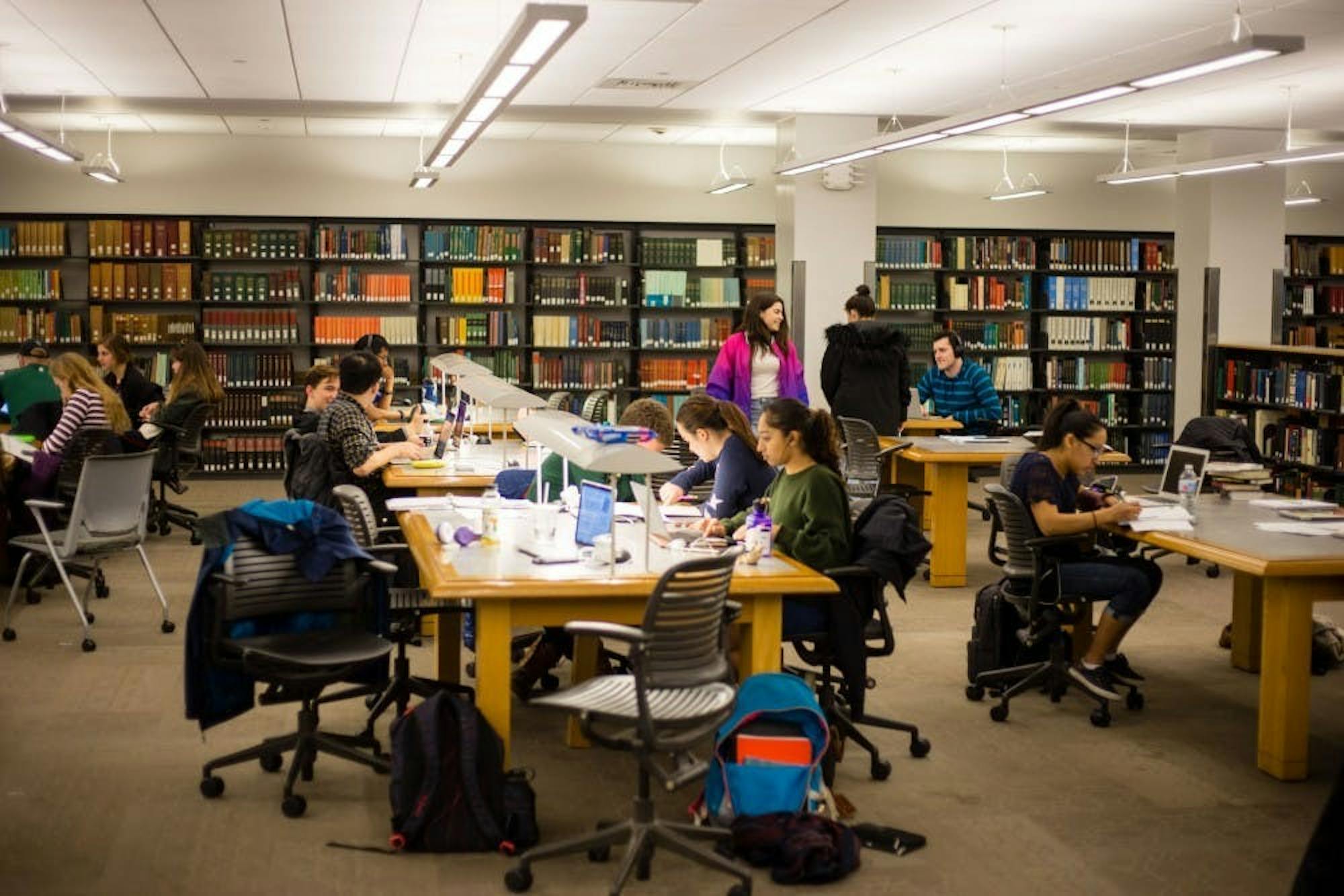It’s week nine, and you arrive at Baker-Berry Library at 8 a.m. There are no people to be found, but belongings were left overnight, claiming the circle tables on 3FB and 4FB. You settle for a cubicle instead. Foolishly, you bring your belongings with you to grab lunch — a freshman mistake. When you return, every single cubicle is taken, and now you struggle to find a study space anywhere in the library. There is a palpable feeling of tension in the air. It’s finals season.
This term, finals won’t be characterized by packed libraries or working lunches in Foco. The virtual format of spring term has not only changed students’ feelings toward finals season, but has also caused professors to change their approach to examinations. With limited ability to oversee tests, many professors are opting for open-note exams and projects.
Hanna Bliska ’20 is taking two lecture-style classes this term, in addition to finishing her senior thesis for environmental studies and completing the third term of her music credit with the Wind Ensemble. Bliska said that her professors are assigning final papers rather than exams.
“For me, it will feel like handing in some final papers rather than feeling like a real exam period,” Bliska said. “They just want us to write and reflect because there’s no way to control [an exam] situation.”
Bliska feels that her professors are being considerate of students’ different circumstances by allowing more time for exams and making assessments open-note.
Usually, final exams can be a make-or-break moment for term grades. This term, however, the credit/no credit grading system lowers the stakes, as students’ transcripts won’t necessarily reflect their exam performance.
“I would definitely say that the pass/fail system has, for seniors, taken a lot of the pressure off, which has been nice,” Bliska said. “I think finals definitely feels a lot different because we don’t have that kind of reading period to study for exams.”
Akiah Watts ’22 took on a fourth class this term to take advantage of the credit/no credit grading system, and she also became a study group leader for PSYC 1, “Introductory Psychology,” to make use of her extra time. On campus, she has previously been a tutor for PSYC 1, which typically requires a significant time commitment during finals period.
“Usually, because I’ll have finals at the same time my tutees have finals, I’ll be balancing when to help them and when to help myself,” Watts said. “But with this pass/fail term, no one has been showing up to the study groups.”
As I talked to Watts, I thought about my own experience in study groups. During the winter term, the study group I was in for a government class saw at most five people in weeks seven and eight. In weeks nine and 10, as the final exam grew closer, attendance tripled.
Watts said that this term, attendance has stayed low even as the end of the term approaches.
“I was thinking about sending out an email to be like, ‘Hi guys, just a reminder that I’m still here!’ But they don’t need me, so it’s fine,” Watts said, adding that she doesn’t expect an increase in attendance in the remaining weeks of the term.
Like Watts, Ami Nwaoha ’23 enrolled in a fourth course in order to take advantage of the free time he has in quarantine. He said that in certain ways, the increased workload has added stress to his term.
“Overall, it’s less stressful because you don’t have to worry about the grades as much, and you have much more time to learn the material,” Nwaoha said. “I can take my time and I don’t have to be constantly grinding, so I actually understand what’s going on in those classes.”
While there may be less external pressure surrounding finals due to the altered grading system, it seems that students still feel internal pressure to perform well and learn the course material.
“I haven’t really been thinking that pass/fail means I don’t have to try anymore. I still try to get something out of my classes and what I’m learning. I still try to improve,” Watts said.
Finals mark the end of a course, and usually, they bring a sense of closure. Pressing “submit” on Canvas from my bedroom of 19 years seems like an anticlimactic end to my first year of college. For the ’20s, it seems like an uninspired conclusion to their time at Dartmouth.
“Typically, there’s a whole week of celebration with seniors after finals and before Commencement,” Bliska said. “This year, we’ll submit everything but have this week of limbo before the conferral of degrees.”
Culminating four years of hard work and not being able to celebrate with your peers is an unfortunate consequence of the pandemic, and many seniors are struggling to describe the feeling of leaving Dartmouth while feeling unfinished.
Although we might not miss the tension and stress of a normal finals season, we will all miss the relief that comes from packing up our books and leaving the library for good.




